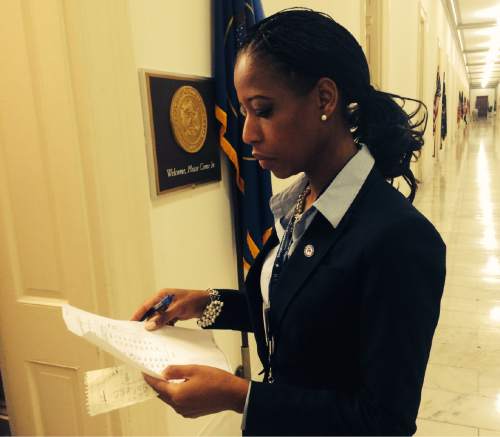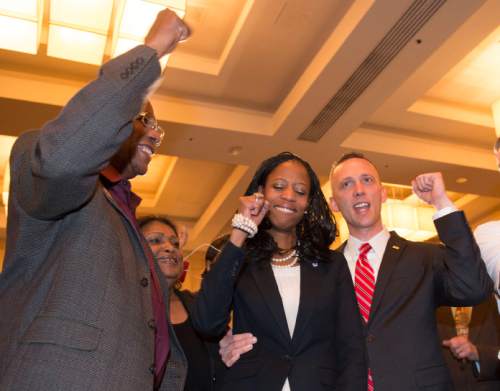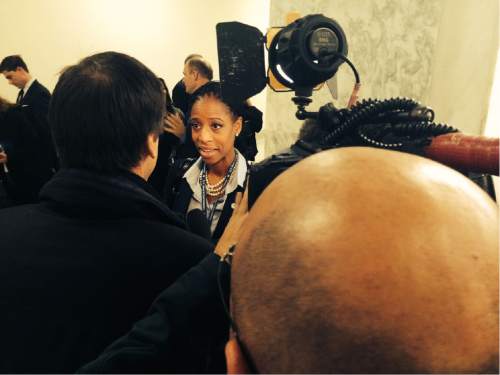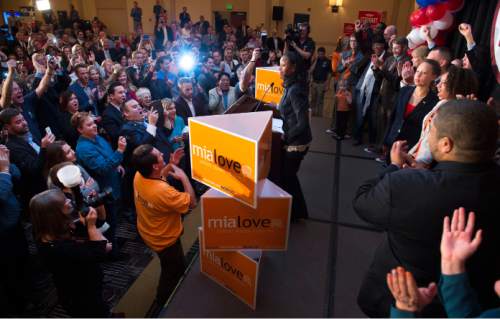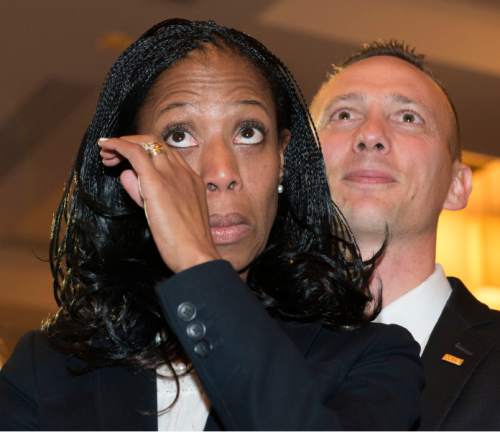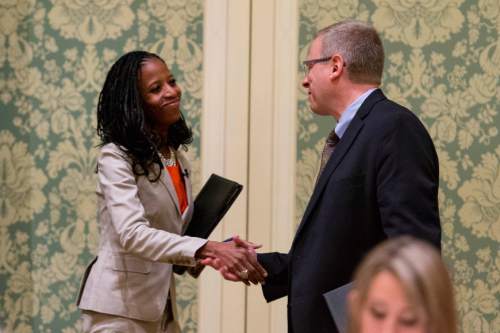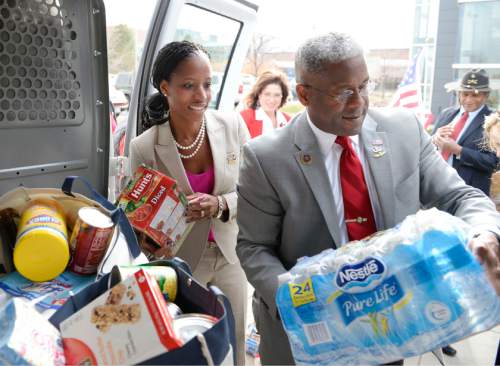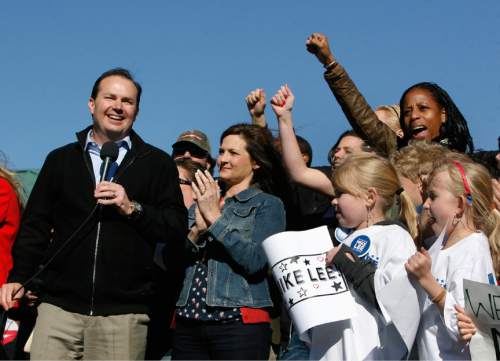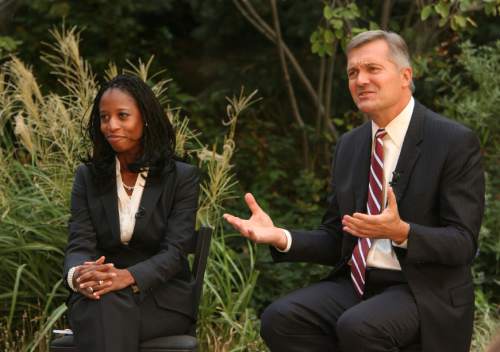This is an archived article that was published on sltrib.com in 2014, and information in the article may be outdated. It is provided only for personal research purposes and may not be reprinted.
Editor's note: This is the seventh and final excerpt from The Salt Lake Tribune's new book: "Mia Love, The rise, Stumble and Resurgence of the Next GOP Star."
In the days after she lost the 2012 election by just 768 votes, Mia Love would suggest she was done with high-level politics. "I was ready to oil paint and just hang out and have a real life."
But it only took six weeks before she and her husband Jason reached out to Dave Hansen, one of the state's most seasoned political consultants.
A shrewd political mind who's developed a reputation for being a master organizer over four decades of campaigning, he had earlier that year helped Sen. Orrin Hatch beat back a serious tea party challenge.
Hansen agreed to meet the Loves for breakfast at Kneaders Bakery on New Year's Eve. When they sat down, she dove right in, saying she was thinking of running again and wanted to know if he'd be willing to manage her campaign.
"That could be very interesting," he said.
Hansen acknowledged what the Loves already believed: Mia's first campaign had lacked a captain.
"They didn't have anyone strong running the ship over there and it's amazing they did as well as they did," he said. "There were too many people in that office who were looking at what job they were going to have in the Mia Love congressional office."
His critique didn't end there.
Hansen agreed with much of the Monday-morning quarterbacking from inside and outside her campaign. The list of complaints included that she spent too much time working on behalf of Mitt Romney; that her attention was split between her mayoral duties and her campaign; and, most important, that she hadn't mastered the issues.
Mia asked Hansen to lead the 2014 rematch. He accepted and got to work. This time it would be different. No parade of Republican stars coming in for fundraisers. No National Republican Congressional Committee aides telling the campaign what to do. Hansen promised to create a campaign where Mia could be Mia.
It had been less than two months since Rep. Jim Matheson won re-election, but Hansen encouraged Mia to begin raising money immediately and to stay publicly engaged. Instead of traditional fundraisers with lobbyists and politicians, Hansen focused on collecting thousands of small donations from people all over the nation, mainly targeting those who gave money in 2012 after watching her speech at the Republican National Convention.
Her fundraising letters focused on her minority status.
"I am sick and tired of the Obama-Democrats and their liberal media mouthpieces telling me my race, gender and background make me a victim," one letter read. "I can be an alternative conservative voice in Washington for immigrants, minorities and women to follow, but first I need your help to get there."
Hansen found it just as easy to keep Mia in the headlines with appearances on Sunday talk shows and speeches at conservative events.
—
Surprise • Matheson was stunned — not that Mia would run again, but that she'd campaign so aggressively mere months after the last one ended.
"We just finished an election," he said. "I think most folks I talk to are tired of the politicking. They want people to work constructively to get things done."
But the Democrat also was happy to once again pounce on her positions as extreme and bad for Utah. He got plenty of ammunition from the Love camp.
The biggest political story of fall 2013 was the government shutdown. Sen. Mike Lee of Utah and Sen. Ted Cruz of Texas had led a Republican charge to block any bill that included money to support the Affordable Care Act, Obama's health care law universally despised by the GOP.
Many within their own party thought this ploy was dumb. Establishment Republicans in Utah fumed at Lee, and the senator's public approval plummeted to 40 percent.
Lee's supporters in Utah decided they needed to show their man some love and on Nov. 2, boosters held a rally at a South Jordan park in Lee's honor. Hundreds of people showed up to chant "We like Mike" on that cold and windy day.
Mia stood onstage near Lee clapping and cheering with the rest of the crowd. Democrats would later use that image to paint her as a supporter of the shutdown.
Though she had just been feet away from Lee at the rally, Mia subsequently tried to put distance between the two of them.
"I'm not going to bash Mike Lee for trying to keep his promises. I think I would have taken a different approach."
She also tried to distance herself from the tea party, which was so influential in her first run and which she had courted this time by holding a fundraiser with Rep. Allen West, R-Fla., who had called Obama a tyrant and compared Obamacare to slavery.
"I consider myself a Republican in the state of Utah who represents everyone," she said. "People try to put labels on you, and I don't believe in labels."
Matheson unloaded.
"She can't reject the tea party label," he said. "She embraced it so much in the last campaign and she's with the poster child of the tea party movement, Allen West."
Matheson had fully engaged, and now the race was on. Political handicappers expected an expensive slugfest, but they'd be wrong. Matheson had shocked Utah's political circles in 2012 by switching to run in the 4th District, and he was about to jolt them again.
In a Facebook post written on a Tuesday, the week before Christmas, Matheson announced he wouldn't run for an eighth term.
His four-paragraph announcement gave no indication as to why he was calling it quits. He'd duck and dodge every time reporters asked, although he did say he was considering a statewide campaign for governor or the Senate in 2016.
Mia was at a grocery store picking up Gatorade for her kids and was on the phone with her scheduler Laurel Price when Price spotted the Facebook post. Mia wanted confirmation. Price then saw that news outlets had already contacted Matheson. Mia was dumbstruck.
"After I hung up with her, for five minutes I didn't remember what I was buying, I didn't remember why I was there," Mia said. "I think I just kind of left everything and sat in the car and tried to call my husband like five times, but he didn't answer."
Later that day, she would tell reporters she wished Matheson well and that his decision to back out of the race didn't change her strategy at all.
Of course, it changed everything.
—
New match • The instant Doug Owens heard Matheson was stepping aside, he knew it was time to make his move. Owens had worked as a corporate defense attorney for all of his adult life, and while he hadn't been particularly active in Utah's Democratic circles, he carries one of the state's most storied political names. He's the son of the late Rep. Wayne Owens, D-Utah, known for his populist, collaborative style and his willingness to shoot for the state's highest political offices. For years, Doug thought about eventually running for office and could think of no better place to serve than Congress, where he could follow in his father's footsteps.
He called Matheson and then huddled with the state's Democratic leaders. He was willing to take on Mia, but he had no desire to be a sacrificial lamb. If he was going to do this, he wanted to map a route to victory.
Owens, 50, is Mormon, soft-spoken, humble and yet stern, a man who smiles infrequently and whose humor is dry and sarcastic. Stylistically, he was a contrast to the outgoing Mia. But he was willing to bet that Utah voters didn't simply want a telegenic personality; they wanted moderation and a break from incessant partisanship. He saw Mia as a "national celebrity" who would cater to the far right, adding to the dysfunction in Washington that he blames for eroding the middle class. He thought that message would resonate with a voting public that had supported Matheson and had supported his father.
Love and Owens politely shook hands and then took their places behind their respective podiums at their first joint appearance in late May during the Utah Taxpayers Association's 2014 conference.
Hansen's insistance that she go back to policy bootcamp paid off. Love spoke with authority and without notes, giving detailed conservative answers that delivered on her goal of convincing the political elites on hand that she was a new-and-improved candidate. The persistent knocks about her being uninformed and ill-prepared began to fade from that day forward.
Owens often read his answers, including a series of barbed criticisms tying Love to Lee's shutdown strategy. He charged that she was "driven by a national tea party agenda.… We need people [in Congress] who understand that hating government is not the same thing as solving a problem." He was relentless, and Love's face grew pained as the 45-minute debate went on.
Afterward, when she emerged into a group of waiting reporters, she was immediately inundated with questions about the shutdown and her appearance at the Lee rally. She said she was supporting a call to eliminate funding for Obamacare, not to shut down the government, and she said she didn't go to that park to support Utah's embattled senator.
"I stood out there with over 2,000 people in South Jordan," she said. "That was who I was standing with."
Love was on the defensive, exactly as Owens had planned.
But in stark contrast to 2012, no group, liberal or conservative, paid for any ads in the 4th District. And without national help, Owens was massively outspent. Mia collected contributions from tens of thousands of individuals and ended with a $4 million-plus fundraising advantage over her Democratic rival.
—
Last chance • Frustrated with low voter turnout, a group of politicos, news executives and academics created the Utah Debate Commission. The result was that each of the four congressional races had one televised debate instead of the multiple forums for select contests held by competing TV stations in past elections. For underdogs like Owens, it became a point of frustration, but Mia was happy. It limited chances for a slip-up while giving her a forum to assuage the concerns of moderate women and Republicans who voted for Matheson. Hansen said the goal was to show she wasn't a "right-wing wacko."
Owens' goal was simpler: to introduce himself to voters, because one in four had no opinion of him. He also sought to convince viewers he was a pragmatic centrist in the Matheson mold.
The expectation was that he'd use this forum to go after Mia, try to rattle her and put her on the defensive. If he was going to make up ground, here was his shot. But the debate that followed had little of the expected acrimony and for the most part was downright civil. There was no eye-rolling or finger pointing. No one raised his or her voice; on many issues, Love and Owens showed remarkable common ground, agreeing on things such as fixes to the Affordable Care Act and the need to reform the immigration system.
Why didn't the underdog candidate who made his living arguing before judges use the one live televised debate to pummel his opponent?
Taylor Morgan, Owens' strategist, said polls indicated Doug would get a bigger bounce by introducing himself to the public than by critiquing Mia's past positions. Also, Owens worried about how he'd be viewed.
"I didn't want to be the sour, angry guy in the corner. It's that simple," he said. "And it isn't really who I am. I only want people to understand the differences on those issues."
A poll released in the days after the debate by Brigham Young University found that Owens had a narrow lead, a shocking development.
It was the exact thing Hansen feared. The whole campaign had been geared toward stopping Owens from gaining traction while fighting off the suggestion that Mia was inevitable, which could lead to complacency. As Hansen put it: "Momentum is hard to stop in politics."
On election night, immediately after the polls closed at 8 p.m., Salt Lake County posted early voting results first — showing Owens ahead by 9 points.
As the hours ticked by, it was clear something was amiss with the Salt Lake County results. Then the website crashed. In the Salt Lake Hilton Hotel ballroom, Mia's supporters stayed glued to their phones, hunting down what little information they could and taking solace in the big screens displaying Fox News' projections that the GOP had wrested back control of the Senate.
When the county website flashed back to life, Hansen stood over his number crunchers in the hotel room where Mia, her family and top aides were parked. There were several precincts still not reporting, but it was unclear which ones.
Mia was down 2,000 votes for awhile. At 11:04 p.m., the total swung her way, up 1,000 over Owens. Then she was up 2,500.
At 11:17, Salt Lake County reported all votes had been counted. Mia led, 50 percent to 47 percent.
Cheers erupted.
And Hansen's phone rang. It was Owens' campaign manager.
"Does Mia have a minute to talk to Doug?" he asked.
Mia took the stage a few minutes later, surrounded by Jason, their three children, family and supporters.
"The naysayers said that Utah would never elect a black Republican LDS woman to Congress," Mia said. "Not only did we do it but we are the first. Proving that we are not interested in dividing Americans based on race, social status or gender. We are more interested in electing individuals based on honesty, integrity and the values we hold dear."
Her victory speech concluded, the news crews swarmed. Lost in the rush of victory was the undeniable fact that Love underperformed in a district that skews so heavily Republican. But disecting the campaign would wait for another day. Her win meant that for the first time a black Republican woman would join Congress.
How did it feel to make history? one reporter asked.
"I didn't make history," she said. "Utah made history tonight." —
"Mia Love: The Rise, Stumble and Resurgence of the Next GOP Star"
The book produced by The Salt Lake Tribune is available at Salt Lake area local bookstores, including Weller Book Works, The King's English, Eborn Book and Frost's Books, and the Brigham Young University bookstore for $9.99. It is available as an e-book for $6.99 from Amazon, Barnes & Noble and iTunes. For more information, please visit MiaLoveBook.com.


